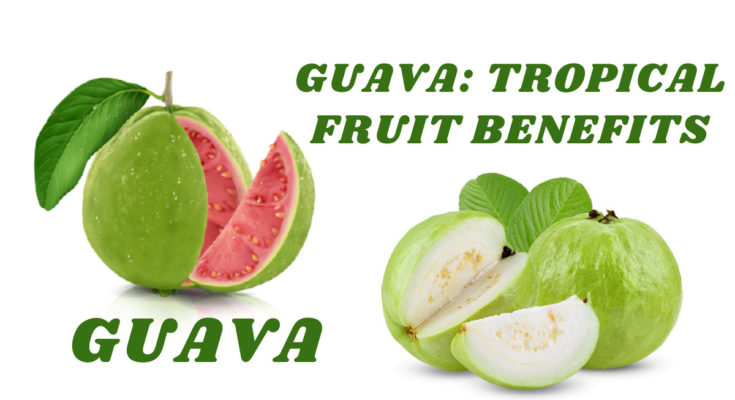GUAVA :-
Guava, also known as Psidium guajava, is a tropical fruit that is native to Central and South America. It is a small, round or oval-shaped fruit that is typically about the size of a tennis ball. The fruit has a green or yellow skin, and the flesh can be white, yellow, pink or red, depending on the variety.
Guava is rich in vitamins C and A, dietary fiber, and antioxidants. It is commonly eaten fresh, but it can also be used to make juice, jam, jelly, and various other desserts. In addition to its culinary uses, guava has a number of potential health benefits. It is believed to support digestion, boost the immune system, and improve heart health, among other things.
HEALTH BENEFITS :-
Guava has several potential health benefits. Some of these include:
1. Boosting the immune system: Guava is a rich source of vitamin C, which is a powerful antioxidant that can help to boost the immune system and protect against infections.
2. Promoting digestion: Guava is high in dietary fiber, which can help to promote healthy digestion and prevent constipation.
3. Reducing the risk of chronic diseases: Guava is also high in antioxidants, which can help to protect against the damage caused by free radicals and reduce the risk of chronic diseases like cancer, heart disease, and diabetes.
4. Improving heart health: Guava is a good source of potassium, which can help to regulate blood pressure and reduce the risk of heart disease.
5. Supporting skin health: Guava contains vitamin C, which is important for the production of collagen, a protein that helps to keep the skin firm and elastic.
6. Managing blood sugar levels: Guava has a low glycemic index, which means that it can help to regulate blood sugar levels and prevent spikes in insulin.
7. Boosting brain health: Guava contains vitamins B3 and B6, which are important for brain health and can help to improve cognitive function and reduce the risk of neurodegenerative diseases.
Overall, adding guava to your diet can be a tasty and nutritious way to support your health and well-being.
USAGE:-
Guava is a versatile fruit that can be used in a variety of ways. Here are some common ways to use guava:
1. Eat it fresh: One of the easiest ways to enjoy guava is to eat it fresh. Simply wash the fruit, cut it in half, and scoop out the seeds and flesh with a spoon.
2. Make juice: Guava juice is a refreshing and healthy drink that can be made by blending fresh guava with water, sugar, and lime juice.
3. Make smoothies: Guava can be added to smoothies for a boost of nutrition and flavor. Simply blend fresh or frozen guava with yogurt, milk, and other fruits like banana or strawberry.
4. Make jam or jelly: Guava can be used to make delicious jams and jellies. Simply boil sliced guava with sugar and water until it reaches a jam-like consistency.
5. Use in salads: Guava can add a sweet and tangy flavor to salads. Simply slice it thinly and toss it with mixed greens, nuts, and a dressing of your choice.
6. Use in desserts: Guava can be used to make a variety of desserts, including pies, tarts, and cakes.
7. Use in savory dishes: Guava can be used in savory dishes, such as salsa or chutney, to add a sweet and tangy flavor.
Overall, guava can be used in many different ways to add flavor and nutrition to your diet. Experiment with different recipes and find the ones that you enjoy the most.
NUTRITIONAL VALUE OF GUAVA :-
Guava is a nutritious fruit that offers various health benefits. It is a good source of vitamin C, fiber, vitamin A, and antioxidants. The nutritional content may vary slightly depending on the size and variety of guava, but generally, a 100-gram serving of guava provides approximately:
- Calories: 68 kcal
- Carbohydrates: 14.3 grams
- Fiber: 5.4 grams
- Protein: 2.6 grams
- Fat: 0.9 grams
- Vitamin C: 228.3 mg (more than 200% of the daily recommended intake)
- Vitamin A: 624 IU
- Folate: 49 micrograms
Additionally, guava contains small amounts of other essential vitamins and minerals like potassium, calcium, magnesium, and phosphorus. Its high fiber content can aid digestion, while vitamin C and antioxidants support the immune system and overall health. Remember that these values are approximate and can vary based on the fruit’s size and ripeness.



